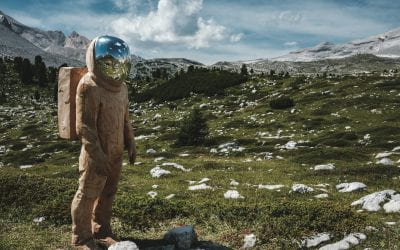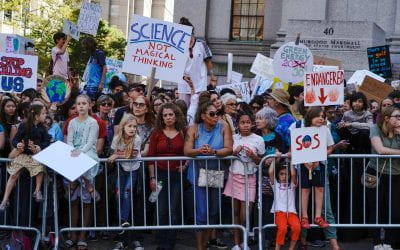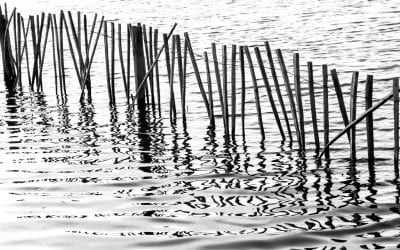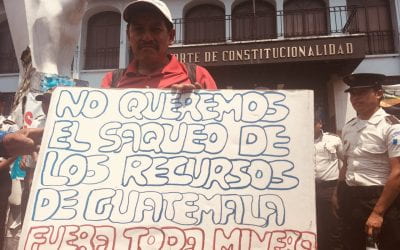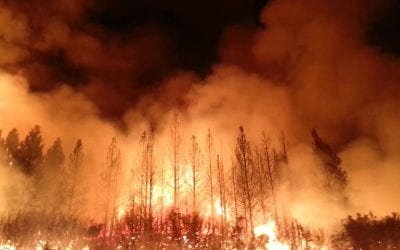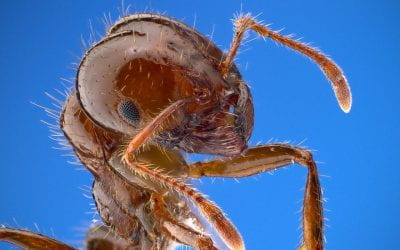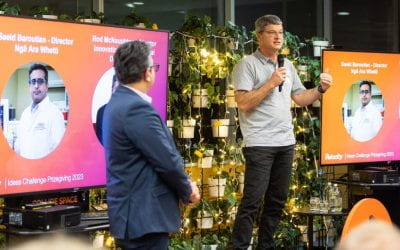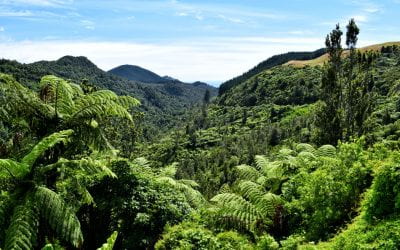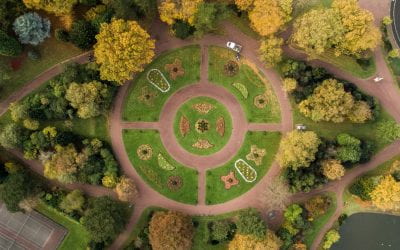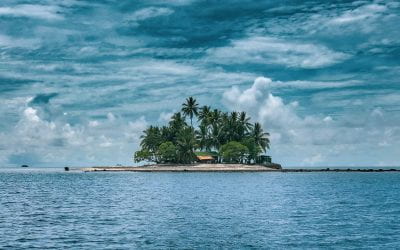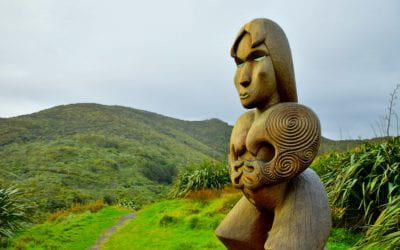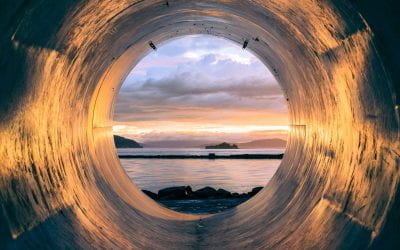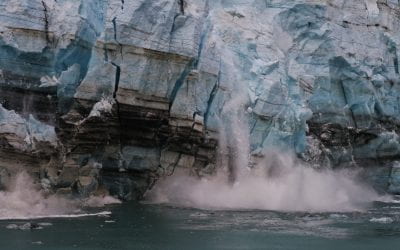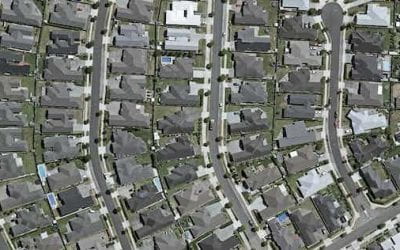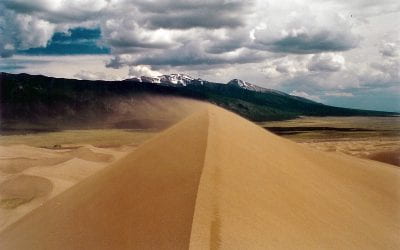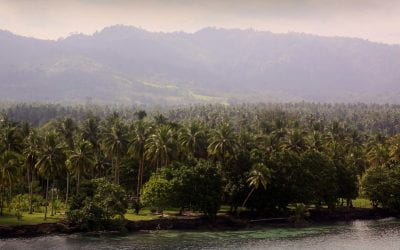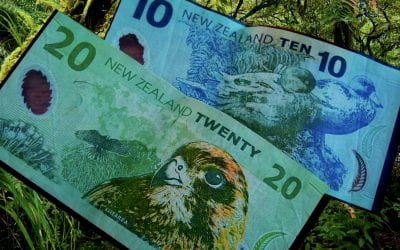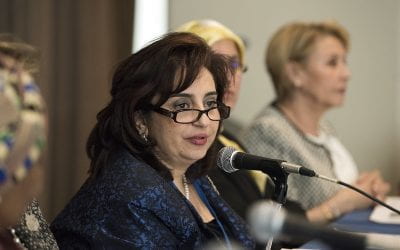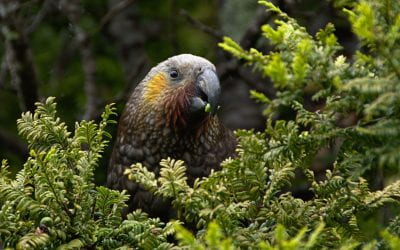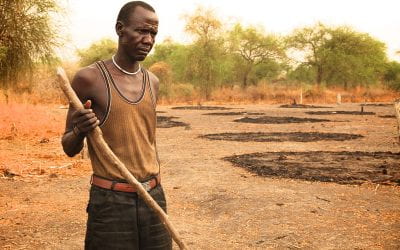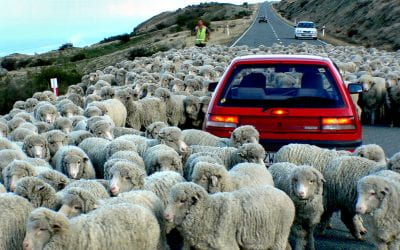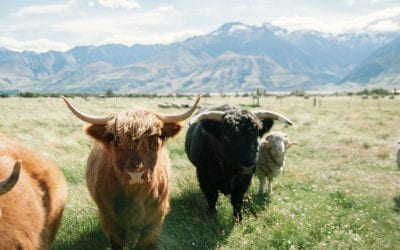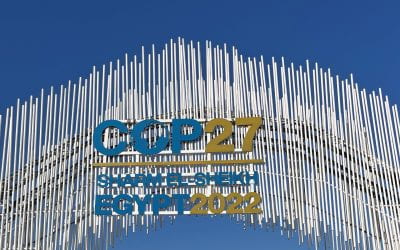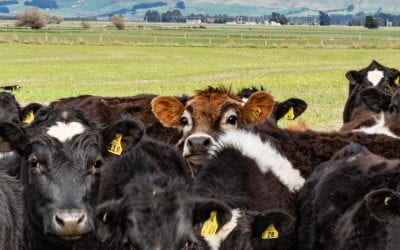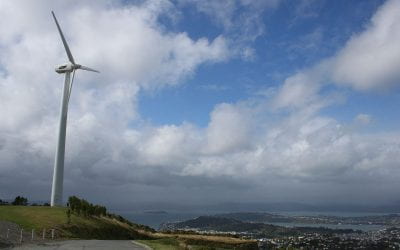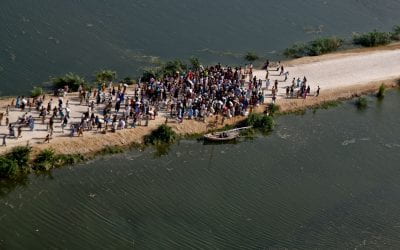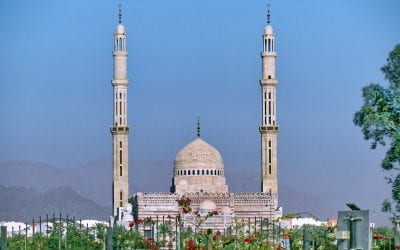Ngā Ara Whetū: Centre for Climate, Biodiversity and Society
The Big Q is a part of Ngā Ara Whetū, working to bring you news and research related to climate, biodiversity and society. Named for the journeys of our collective ancestors to the shores of Aotearoa, New Zealand, Ngā Ara Whetū (“Star Paths”), responds to challenges of attaining sustainable futures and collective wellbeing through enabling and enhancing collaborative research and training.
Ngā Ara Whetū is networked with local and global communities of purpose, practice and understanding, who share aspirations for accelerating actions that promote lasting protection of the planet, its natural resources, and peaceful, just and inclusive societies.
Sustain: Are we facing a water crisis?
What is the state of our water? What are the primary challenges to ensuring clean, potable water for generations to come? And what are the politics that either prevent or advance the availability of healthy waterways and drinking water? To answer these questions, Associate Professor Dr Maria Armoudian speaks to Dame Juliet Gerrard, Professor Naresh Singhal, Associate Professor Daniel Hikuroa and Dr Filippo Verre.
Sustain: How can we deal with the threat posed by microplastics?
From the Antarctic to the deepest depths of the ocean, microplastics are found in increasingly large numbers. These tiny, seemingly inescapable plastics pose a range of threats to human health, animal life and the ecosystems on which we rely. How can we deal with this...
Sustain: What is the link between authoritarianism and climate change?
Despite increasing signs of a climate crisis, false information continues to drive decision-making at the highest level, particularly in countries which have recently taken a turn towards authoritarianism.
Sustain: What role can documentary play in combating climate change?
On the 9th of November, Nga Ara Whetu held its inaugural eco-film festival. Afterwards, co-director Dr Maria Armoudian hosted a panel discussion with University of Auckland Professor Dr Annie Goldson, senior lecturer Dr Mark Harvey, and the executive producer of Milked Suzie Amis Cameron.
Sustain: What role can litigation play in fighting climate change?
European Court of Human Rights, courtroom, 2014 by Adrian Grycuk. Used under CC BY-SA 3.0 PL In recent years, thousands of lawsuits have been filed around the world by private individuals to NGOs and state governments in an attempt to force greater action on climate...
Sustain: How can we tackle income inequality and environmental degradation?
On 13th September, Ngā Ara Whetū co-hosted a symposium on the challenges of inequality and environmental degradation with Juncture: Dialogues on Inclusive Capitalism, a research centre based in the Business School at the University of Auckland.
Sustain: What role can local and traditional ecological knowledge play in fighting climate change?
The UN Convention on Biological Diversity (CBD) has outlined a plan for humanity to live in harmony with nature by 2050. Our cities aren’t going away, so how can we use biodiversity as a building block and work with indigenous technologies to take action? Pauline Herbst talks with international landscape designer and keynote speaker at the World Green Infrastructure Congress 2024, Julia Watson, to answer these questions.
Sustain: What role can seaweed farming play in the fight against climate change?
AgriSea CEO Clare Bradley and Tane Bradley (AgriSea CIO) inspect a seaweed harvest on a New Zealand beach. ©AgriSea. With increasing interest in aquaculture as an alternative to land-based agriculture, Dr Pauline Herbst speaks to Prof Andrew Jeffs, from the Institute...
Is New Zealand’s plan to revive offshore oil exploration out of step with global demand?
The government plans to reopen New Zealand’s territorial waters to oil drilling. This flies in the face of projections that demand for oil could peak as early as this decade.
Sustain: What are the future of cities in a climate crisis?
Brisbane City Flood 2013. Photo by ShepsSnaps, licensed under CC BY-SA 2.0 With over half the global population living in urban centres, a number which is projected to rise to around two-thirds by 2050, the relationship between cities and the climate crisis is...
Planet + People vs Plastics
On Earth Day 2024, Ngā Ara Whetū partnered with Te Aka Mātauranga Matepukupuku, the Centre for Cancer Research, to discuss the ubiquitous presence of plastics in our environment, and the impact they are having to the land, sea, air, animals, and on our own health and well-being.
Could one small step for supply chains mean one giant leap toward sustainable space exploration?
Without proactive leadership on environmental sustainability, the New Zealand space industry risks losing competitive advantage in a global space market with increasingly environmentally conscious customers. Shedding light on supply chains is the first step.
Who are today’s climate activists? Dispelling three big myths on Earth Day.
It’s easy to get caught up in the myths about climate activism, particularly in today’s polarized political environment. On Earth Day 2024, let’s explore the truth about three of the big myths being told about climate activism and the climate movement today.
Sustain: How can nature guide our remedies for climate change driven flooding?
Maria Armoudian discusses nature-based solutions to flooding with Gary Brierley and Tim Welch.
Sustain: What does a new President mean for biodiversity in Guatemala?
Guatemala is one of the most dangerous countries in the world for land and environmental activists. Pauline Herbst speaks with Maya Q’eqchi’ community leader in education Fredy Oxom and anthropologist Callie Vandewiele to find out why a silent indigenous led protest is important for biodiversity.
Sustain: Is forestry contributing to climate change?
Maria Armoudian discusses the role of forestry in climate change with Kevin Trenberth, George Perry and Cate Macinnis-Ng.
Reimagining Our World: A Competition from Ngā Ara Whetū and The Big Q
Ngā Ara Whetū and The Big Q have come together with a competition that encourages us to think differently. This competition asks participants to explore new possibilities in redefining success and beauty.
Sustain: What can be done about invasive species?
Maria Armoudian discusses invasive species with ecological experts Jacqueline Beggs and Al Glen.
Rod’s Big Q: What’s the new business model in a world with climate change?
Rod McNaughton is a professor of entrepreneurship and academic director of the Centre for Innovation and Entrepreneurship. Drawing on his experience developing entrepreneurial ecosystems and helping start-ups launch and grow, Rod collaborates across the...
JR’S BIG Q: HOW CAN WE LIVE MORE LIGHTLY ON THE EARTH?
JR Rowland is an Earth scientist with research interests in geothermal energy and mineral resources, earthquakes and volcanoes. She is the Deputy Dean in the Faculty of Science. JR is a structural geologist passionate about tectonic-magmatic-hydrologic interactions,...
Rethinking Our Economy: The Case for a Circular Approach
Ngā Ara Whetū directors Saeid Baroutian and Maria Armoudian talked about a move to a circular economy with The Packaging Forum CEO Rob Langford, head of sustainability at Te Whatu Ora Waitematā Larisa Thathiah.
Niki Harre’s Big Q: How can we better cooperate and protect the natural world?
Niki Harre is the Head of School for Psychology in the Faculty of Science and is a director for Ngā Ara Whetū. She is a community psychologist with research interests in sustainable organisation, core human values, religion, and political activism. She coordinates a...
Jacqueline Beggs’ Big Q: How do we maintain NZ’s unique biodiversity?
Jacqueline Beggs is an ecologist and a committed advocate for Aotearoa New Zealand’s unique biodiversity, here is her Big Q.
Saeid Baroutian’s Big Q: How do we transform our economy?
Saeid is an Associate Professor in the Department of Chemical & Materials Engineering. He is the Director of Innovation at Ngā Ara Whetū Centre for Climate Change, Biodiversity and Society and the Director of Circular Innovations (CIRCUIT) Research Centre at the...
Can the economy go round? The Ngā Ara Whetū Podcast talks circular economy.
Can New Zealand become a circular economy? Can we change from a throwaway economy to one that reuses resources? And what does that mean for business?
Are we doing enough? Ngā Ara Whetū’s reaction to the 6th IPCC report
The government is focusing on “bread and butter” issues but there will be less food for everyone if we do not tackle to climate crisis, argues Ngā Ara Whetū.
We’re building harder, hotter cities: Should we instead protect and grow urban green spaces?
Housing intensification in Hamilton. PCE, CC BY-SA Timothy Welch, University of Auckland Recent extreme weather events have provided a foretaste of how supercharged storms might threaten our future. So the release today of a new report from the Parliamentary...
What do you mean we are running out of sand?
Although the importance of water as a resource is well accepted, fewer people know that sand is the second most consumed resource globally.
West Papuan campaigners want a ‘green state’. Could it help the planet?
Independence activists want to combine the best parts of liberal democracy with indigenous traditions.
What would a Green Recovery from COVID-19 look like for Aotearoa New Zealand?
To arrest economic downturn, many governments have responded with massive fiscal packages to boost the economy, maintain employment, and stabilise core industries. However, there is deep concern that these economic responses will undermine the goals outlined in the Paris Climate Accords and cause a surge in greenhouse gas emissions.
Why is the UN calling for a gendered approach to climate – and how does Aotearoa stack up?
On November 14th, 2022, COP27 included the conference’s first-ever day devoted to gender. So what is Aotearoa New Zealand doing to address the intersection between climate and gender, and how do we stack up to Sima Bahous’s three asks?
Avoiding climate breakdown depends on protecting Earth’s biodiversity – can the COP15 summit deliver?
COP15 needs to mark a step change in how quickly and how seriously the international community responds to catastrophic nature loss. The focus is expected to be on 30×30, a push to protect 30% of land and sea for nature by the end of this decade.
How does COP27’s loss and damage deal really look to the Global South?
After two weeks of fractious discussions, at the very last minute COP27 came up with an agreement on ‘loss and damage’ – providing financial assistance to poorer nations who are already facing the catastrophic impacts of climate change. But how long will it take for these words to translate into actions?
Why do social ties matter to climate politics?
Policy-makers frequently fail to communicate scientific knowledge about climate change effectively, with the result that targeted groups often reject potentially useful advice. Our research addressed New Zealand dairy farmers’ perceptions of climate conditions and their perceptions of climate science.
From farming to fermentation: Could New Zealand ‘brew up’ new foods to reduce agricultural emissions?
Addressing the problem of New Zealand’s agricultural emissions has mainly focused on technical fixes aimed at reducing methane and nitrous oxide produced by livestock and fertiliser and relying on voluntary agreements with the industry. But these measures may not result in substantial emissions reductions any time soon.
COP27: Breakthrough? Or an inadequate response to the climate crisis?
For 30 years, developing nations have fought to establish an international fund to pay for the “loss and damage” they suffer as a result of climate change. As the COP27 climate summit in Egypt wrapped up over the weekend, they finally succeeded. While it’s a historic moment, the agreement of loss and damage financing left many details yet to be sorted out. What’s more, many critics have lamented the overall outcome of COP27, saying it falls well short of a sufficient response to the climate crisis.
The cow in the room… A problem of production or consumption?
Techno-scientific solutions have been thrown at the problem of farm-based greenhouse gas emissions. It’s an economy in and of itself.
What should New Zealand do to commit fully to tackling climate change?
We need to invest in clean technologies and circular economies to build a sustainable, diversified economy. And that will also lessen our dependence on carbon-emitting industries, say leading Auckland academics.
COP27: Why can rich countries no longer ignore calls to pay the developing world for climate havoc?
Payments from high-emitting countries to mitigate the harm that climate change has caused in the most vulnerable parts of the world is finally on the agenda for discussion at a global climate change summit, more than 30 years after the idea was first articulated by delegates from small island developing states.
What can be expected from COP27?
The world’s leaders are gathering for another global climate meeting, this time in Sharm El-Sheikh, Egypt. Expect a bustle of promises and pacts from countries and companies. Expect pressure on states to support people who are most and permanently affected by climate change. Don’t expect much more, but equally don’t lay the blame solely on the United Nations.











